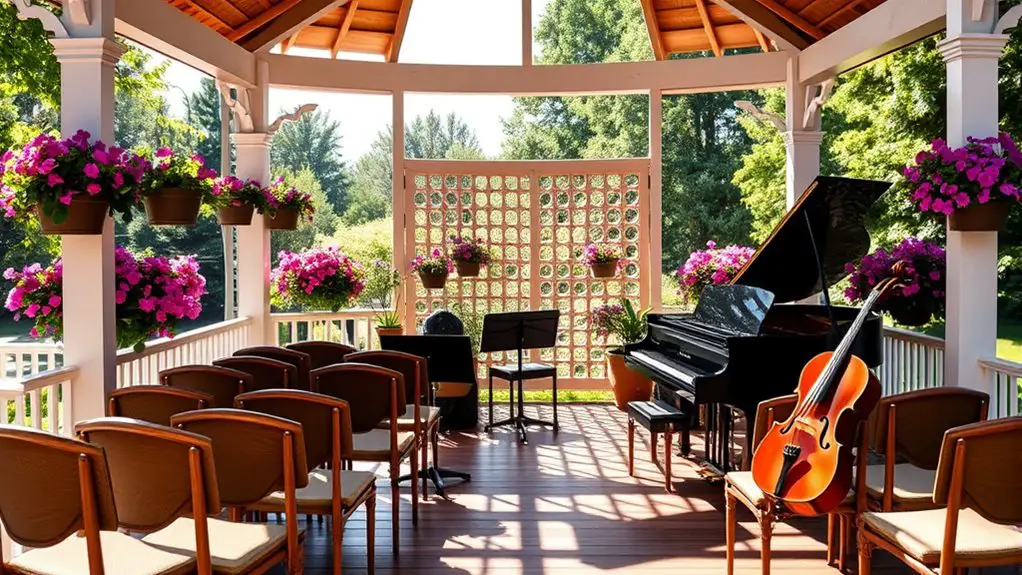To organize a music masterclass in your gazebo, start by choosing a pleasant date and time, ideally in spring or early fall. Plan an engaging agenda with diverse workshops, allowing breaks for networking. Prepare the gazebo for ideal acoustics with proper seating and sound equipment. Create a comfortable atmosphere with decorations that fit the theme. Finally, gather feedback from participants to improve future events. There’s plenty more to reflect on to guarantee a successful experience.
Choosing the Right Date and Time
When should you schedule your music masterclass to attract the most participants? Start by considering weather considerations; aim for a time when the climate’s pleasant, allowing your participants to enjoy their experience fully. Spring and early fall often provide ideal conditions. Next, think about audience availability. Weekends typically work best, as people are more likely to be free from work commitments. If you can, avoid holidays or major events that might conflict with your class. Additionally, a late morning or early afternoon slot can be appealing, offering flexibility for those with evening plans. By aligning your schedule with favorable weather and participant availability, you’ll create an inviting atmosphere that encourages more musicians to join you in your gazebo.
Selecting the Ideal Format for Your Masterclass
When it comes to selecting the ideal format for your masterclass, you’ll want to take into account your teaching style and how that aligns with your participants’ skill levels. Defining these elements will not only enhance the learning experience but also guarantee everyone feels engaged. Additionally, setting a well-thought-out duration can help maintain focus and energy throughout the session.
Choose Teaching Style
Choosing the right teaching style for your music masterclass is essential to its overall success, as it sets the tone for engagement and learning. Consider a mix of interactive demonstrations and personalized feedback to create an inviting atmosphere. This approach encourages participants to actively engage with the material, making it easier for them to absorb complex concepts. You might opt for hands-on activities where students can practice techniques in real-time, enhancing their understanding. Additionally, providing individualized feedback fosters a sense of connection and growth, allowing each participant to feel valued. Ultimately, your teaching style should resonate with your audience’s desire for freedom and creativity, making the masterclass an enriching experience they’ll cherish.
Define Skill Levels
Defining skill levels among participants is essential for selecting the ideal format for your music masterclass, as it guarantees that everyone receives the instruction best suited to their needs. Start by evaluating your attendees—some may be keen to learn beginner techniques, while others might be ready to explore advanced strategies. Consider offering tiered sessions that cater to both ends of the spectrum. For beginners, focus on foundational skills, such as rhythm and basic chords, fostering a supportive environment. For advanced participants, explore complex compositions and improvisation techniques. This approach not only enhances individual growth but also promotes a collaborative atmosphere, where everyone feels empowered to express themselves musically, regardless of their starting point.
Set Duration Wisely
Setting the duration of your music masterclass is essential for maximizing engagement and learning. You want to create an experience that captures attention without overwhelming your participants. Here are some tips to guarantee duration flexibility while incorporating effective engagement strategies:
- Short Sessions: Consider 60-90 minute blocks to maintain energy levels.
- Breaks: Incorporate short breaks to allow for reflection and informal discussions.
- Interactive Elements: Use Q&A sessions to foster participation and keep the atmosphere lively.
- Feedback Loops: Encourage participants to share their thoughts on the duration to improve future classes.
Inviting Participants and Promoting Your Event
Inviting participants and promoting your music masterclass is essential to its success, and getting the word out effectively can make all the difference. Start by identifying your target audience—whether they’re aspiring musicians, local talent, or music enthusiasts. Create engaging promotional materials that highlight the unique aspects of your masterclass, like guest instructors or interactive sessions. Utilize social media platforms, community boards, and local music shops to spread the word. Consider hosting a sneak peek or a free introductory session to pique interest. Personal invitations can also create a sense of exclusivity. Don’t forget to include essential details like date, time, and location, ensuring everyone knows how to join in on this creative experience.
Preparing the Gazebo for Optimal Acoustics
While you might envision a picturesque setting for your music masterclass, the gazebo’s acoustics play an essential role in creating an immersive experience. To guarantee ideal sound reflection and a rich auditory atmosphere, consider these tips:
- Use acoustic materials: Hang sound-absorbing fabrics or panels to reduce echoes.
- Position seating wisely: Arrange chairs in a semicircle to enhance sound distribution and engagement.
- Minimize outdoor noise: Choose a time when traffic and nature sounds are at their lowest for uninterrupted sessions.
- Test the space: Before the class, play different instruments to gauge how sound travels and make adjustments as needed.
Setting Up Equipment and Supplies
When setting up for your music masterclass, you’ll want to make certain you have all essential sound equipment ready to go, including microphones and speakers that suit your space. Comfortable seating arrangements are just as important, so consider how to position chairs for ideal sightlines and ease of movement. By thoughtfully organizing these elements, you’ll create an inviting atmosphere that enhances the learning experience for everyone involved.
Essential Sound Equipment
To create an impactful music masterclass, you’ll need to set up essential sound equipment that enhances both the learning experience and the performance quality. Choosing the right equipment types is vital for achieving excellent sound quality. Here’s what you should consider:
- Microphones: Invest in high-quality mics to capture every note and nuance.
- Speakers: Choose powerful speakers that can fill your gazebo with clear sound.
- Mixing Console: A versatile mixer lets you balance audio levels for a polished performance.
- Cables and Stands: Reliable cables and sturdy stands guarantee everything stays connected and stable.
With this equipment, you’ll create an inviting atmosphere where creativity can flourish and participants can truly enjoy the music.
Seating and Comfort Arrangements
Creating an engaging environment for your music masterclass goes beyond just sound equipment; seating and comfort arrangements play a significant role in how participants interact and absorb the information. Consider a variety of seating options that promote relaxation and focus.
Here’s a table to visualize your choices:
| Seating Options | Comfort Features |
|---|---|
| Folding chairs | Cushioned seats |
| Benches | Back support |
| Floor cushions | Blankets for coziness |
| Bean bags | Adjustable height |
Creating a Comfortable Atmosphere
A welcoming environment can greatly enhance the learning experience during a music masterclass, as it fosters creativity and encourages participants to express themselves freely. To create this atmosphere in your gazebo, consider the following elements:
- Ambiance lighting: Use soft, warm lights to set a relaxing tone.
- Comfortable seating: Provide cushions or lounge chairs that invite participants to settle in.
- Natural elements: Incorporate plants or flowers to connect with the outdoors and inspire creativity.
- Background music: Play gentle instrumental tracks to stimulate the mind without distracting from discussions. Additionally, consider using floral arrangements to enhance the natural beauty and create a more inviting space.
Crafting a Structured Agenda
While you may be keen to plunge into the artistic aspects of your music masterclass, having a well-structured agenda is essential for maximizing the experience for both participants and instructors. A clear agenda allows for agenda flexibility, letting you adapt based on participant engagement.
Here’s a simple framework to reflect upon:
| Time Slot | Activity |
|---|---|
| 10:00 AM | Welcome & Introductions |
| 10:30 AM | Workshop Session 1 |
| 12:00 PM | Break & Networking |
| 1:00 PM | Workshop Session 2 |
This structure provides an outline while allowing spontaneity. Participants will appreciate the balance, ensuring they feel guided yet free to explore their creativity. Additionally, organizing your masterclass in a gazebo provides shelter from the elements, enhancing comfort for all involved.
Gathering Feedback and Reflecting on the Experience
How can you truly measure the success of your music masterclass? Gathering feedback is essential. Use participant surveys to gauge their experience and insights. After the class, host reflection sessions where you can engage in open dialogue. This not only strengthens community ties but also provides invaluable perspectives for future events. Here are some key aspects to contemplate:
- Assess overall satisfaction and specific learning outcomes.
- Encourage participants to share their favorite moments.
- Identify areas for improvement to enhance future masterclasses.
- Create a space for sharing creative ideas and suggestions.
Frequently Asked Questions
What Type of Music Genres Should Be Focused on for the Masterclass?
When choosing music genres for your masterclass, consider pop music for its broad appeal, classical music for its technical foundation, jazz improvisation for creativity, and folk traditions to connect with cultural roots. Each offers unique insights.
How Long Should the Masterclass Last for Optimal Engagement?
For ideal engagement, aim for a duration of two to three hours. This allows ample time for participant feedback, fostering interaction and creativity while keeping energy levels high and sustaining interest throughout the masterclass.
Can I Charge a Fee for Participants to Attend?
Did you know that 73% of workshop attendees prefer paid events for perceived value? Charging a fee can create participant incentives, allowing you to explore diverse fee structures while enhancing commitment and engagement in your masterclass experience.
What Age Groups Are Suitable for This Masterclass Format?
When considering age appropriateness, think about youth engagement. Targeting ages 10 to 18 allows for creativity and freedom while fostering musical growth. Tailor your content to their interests, ensuring everyone feels included and inspired.
How Can I Find Qualified Instructors for the Masterclass?
Finding qualified instructors requires effective networking strategies. Tap into local music schools, online platforms, and social media groups. Your recruitment efforts should emphasize creativity, passion, and the desire to inspire, ensuring a vibrant learning environment.

